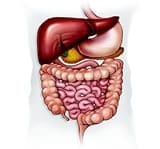Your liver plays a critical role in your body, helping to cleanse your blood of alcohol and other toxins, producing the bile you use in digestion, and working to manufacture important proteins. However, like the rest of your body, your liver isn’t immune to the effects of celiac disease — in fact, celiac frequently affects your liver.
It’s not unusual for people with just-diagnosed celiac disease to hear they also have mildly elevated liver enzymes, which sometimes — but not always — indicate a problem with your liver.
Fortunately, once celiac disease treatment begins in the form of the gluten-free diet, these enzymes typically return to normal levels.
But celiac disease also is associated with a higher risk of more serious liver conditions, ranging from fatty liver disease to severe liver failure.
What is Celiac Disease?
In many cases — but not all — people with celiac have found it’s possible to improve or even reverse these conditions by following the gluten-free diet. However, it’s not clear if gluten consumption actually causes these liver diseases in people with celiac disease, or if some other factor — possibly genetics — is in play.
Medical Test Results: Liver Enzymes Often Elevated
Physicians use a panel of common medical tests to monitor your liver’s function, including measurements of the liver enzymes aspartate aminotransferase (AST) and alanine aminotransferase (ALT). If your liver doesn’t function properly due to injury or illness, these tests will show a high result, i.e., elevated liver enzymes.
Even if you have elevated liver enzymes, it doesn’t necessarily mean you have a problem with your liver. One medical study found that 42% of newly diagnosed celiac patients had mildly elevated liver enzymes. Since these enzymes returned to normal levels once the people started a gluten-free diet, the researchers concluded they didn’t represent a problem.
Another study found a much lower percentage of newly diagnosed celiacs — not statistically significant from a non-celiac control group — had elevated liver enzymes. However, the study also found that liver enzyme levels fell significantly in celiacs once they began to follow the gluten-free diet, even if those enzyme levels were within normal ranges pre-gluten-free.
Fatty Liver Disease, Celiac Disease Linked
Non-alcoholic fatty liver disease (i.e., fatty liver disease that’s not associated with alcohol abuse) is on the rise in the United States and worldwide, largely because it’s strongly linked to obesity and diabetes. When you have fatty liver disease, your liver literally gets “fat” — your liver’s cells accumulate fat molecules, and the entire organ enlarges.
Most people with fatty liver disease don’t have symptoms, and the condition only is considered serious if it begins to progress to liver inflammation and damage.
Several medical studies have linked fatty liver disease with celiac disease. In the largest and most recent study, published in June 2015 in the Journal of Hepatology, researchers compared the risk of developing non-alcoholic fatty liver disease in nearly 27,000 people with celiac disease to the risk in similar individuals without celiac.
The study found the risk of developing fatty liver disease to be nearly three times higher in those with celiac disease. Surprisingly, children with celiac had the highest risk for fatty liver disease. The risk of developing the liver condition was much higher in the first year following a celiac diagnosis, but remained “significantly elevated” even 15 years beyond the celiac diagnosis.
In another study, which took place in Iran, researchers found celiac disease in 2.2% of patients with non-alcoholic fatty liver disease, most of whom were not overweight or obese. They concluded that clinicians should consider screening for celiac disease in people with fatty liver disease who don’t have obvious risk factors for that condition, such as being overweight or obese.
Finally, clinicians from Germany wrote about an underweight 31-year-old woman with fatty liver disease. She was diagnosed with celiac disease and began the gluten-free diet, and her liver enzymes rose briefly but then fell to completely normal levels.
Celiac Found In 6% of Autoimmune Hepatitis Patients
It’s no secret that people with one autoimmune disease — for example, celiac disease — risk being diagnosed with another. Apparently, autoimmune hepatitis is no exception — rates of celiac disease in autoimmune hepatitis patients are far higher than rates of celiac in the general population.
In autoimmune hepatitis, your immune system attacks your liver. Drug therapy with corticosteroids may slow down the condition’s progression, but eventually, it may progress to cirrhosis and liver failure, which necessitates a liver transplant.
A study from Italy looked at the rate of undiagnosed celiac disease in people with autoimmune hepatitis. Three of 47 consecutive patients with autoimmune hepatitis tested positive in celiac blood tests and biopsy for celiac disease, indicating a rate of about 6%.
Because of these results, the authors recommended screening all autoimmune hepatitis patients for celiac disease.
Study: Gluten-Free Diet May Reverse Liver Failure
At least one study reports that instituting a gluten-free diet in people diagnosed with both celiac disease and liver failure actually can reverse the liver failure.
The study, conducted in Finland, looked at four patients with untreated celiac disease and severe liver failure. One of these patients had congenital liver fibrosis, one had hepatic steatosis (i.e., fatty liver disease), and two had progressive hepatitis. Three of the people were being considered for a liver transplant.
All four were able to reverse their liver disease when they began following a gluten-free diet.
The study also screened 185 liver transplant patients for celiac disease. Eight of these patients (4.3%) ultimately were diagnosed with biopsy-proven celiac disease. In fact, six of the eight had been diagnosed previously, but had failed to adhere to the gluten-free diet.
The study authors suggested that the liver damage might not reflect malabsorption; instead, they said, liver damage “may well be a gluten-dependent immunologically induced extraintestinal manifestation of celiac disease.” In other words, the gluten in your diet may cause your immune system to attack your liver as well as your small intestines.
Most Liver Disease Not Gluten-Related
Even if you have a liver condition plus celiac disease, you shouldn’t assume the two are related; most liver conditions — including hepatitis and alcoholic liver disease — are not.
However, if it’s not clear what’s causing your liver disease, plus you have symptoms that could indicate celiac disease, you should consider talking to your doctor about being tested for celiac, since it’s not uncommon for celiac and liver disease to appear in concert.
The good news is, there’s some evidence that shows you may be able to reverse your liver disease once you’re following a gluten-free diet.
Sources:
Bardella M.T. et al. Prevalence of hypertransaminasemia in adult celiac patients and effect of gluten-free diet. Hepatology. 1995 Sep;22(3):833-6.
Kaukinen K. et al. Celiac Disease in Patients With Severe Liver Disease: Gluten-Free Diet May Reverse Hepatic Failure. Gastroenterology 2002;122:881-888.
Korpimäki S. et al. Gluten-Sensitive Hypertransaminasemia In Celiac Disease: An Infrequent and Often Subclinical Finding. American Journal of Gastroenterology. 2011 Sep;106:1689-96.
Mounajjed T. et al. The liver in celiac disease: clinical manifestations, histologic features, and response to gluten-free diet in 30 patients. American Journal of Clinical Pathology. 2011 Jul;136(1):128-37.
Rahimi A.R. et al. The prevalence of celiac disease among patients with non-alcoholic fatty liver disease in Iran”. Turkish Journal of Gastroenterology. 2011 Jun;22(3):300-4.
Reilly N.R. et al. Increased risk of non-alcoholic fatty liver disease after diagnosis of celiac disease. Journal of Hepatology. 2015 Jun;62(6):1405-11.
Villalta D. et al. High prevalence of celiac disease in autoimmune hepatitis detected by anti-tissue tranglutaminase autoantibodies. Journal of Clinical Laboratory Analysis. 2005;19(1):6-10.
About the writer – Jane Anderson is a Celiac Disease and Gluten Sensitivity Expert. She writes about medical issues for both physicians and patients in a variety of different publications. Since late 2003, Jane has been coping with celiac disease and the gluten-free diet, and she now helps other celiac disease patients learn how to eat gluten-free and get healthy.
——————









 The Healing Place LLC helps all ages to find relief from chronic pain, chronic digestive problems and balance hormones naturally. We practice COVID19 safety. Don’t forget to check on our online school HealingPlaceEnergySchool.com. Thank you.
The Healing Place LLC helps all ages to find relief from chronic pain, chronic digestive problems and balance hormones naturally. We practice COVID19 safety. Don’t forget to check on our online school HealingPlaceEnergySchool.com. Thank you.
Recent Comments